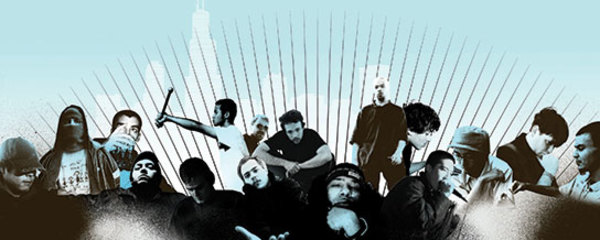Galapagos 4: The Island of Hip-Hop
“We’re trying to bring back actual intelligence and reality to [hip-hop],” says Jeff Kuglich, owner […]
Galapagos 4: The Island of Hip-Hop
“We’re trying to bring back actual intelligence and reality to [hip-hop],” says Jeff Kuglich, owner […]

“We’re trying to bring back actual intelligence and reality to [hip-hop],” says Jeff Kuglich, owner and president of Chicago-based label Galapagos 4. Kuglich started the imprint in 1999 with little but a clearly articulated mission: to preserve the integrity of hip-hop music. Sure, it smacked of fresh-from-college idealism, but Kuglich, who was then 22, somehow managed to express his high-minded vision without pretension or arrogance. And after six years of hacking away at the music industry, Kuglich’s devotion to hip-hop culture is still so earnest it’s damn near admirable.
The label is home to artists of the same ilk. Take Typical Cats, a trio of MCs (Qwaazar, Denizen Kane and Qwel) who have gleefully embraced the underground ethos, candidly exploring socio-political issues while staying sharply focused on literary mechanics. Their 2001 self-titled debut was among the first of G4’s releases, recorded at the label’s original Chicago HQ, a “house-slash-office-slash-studio” furnished sparingly with one microphone and an array of dated analog equipment. But the gritty crackle and pop quality of those early recordings only added to G4’s indie mystique. “It’s not like we went out and bought all that stuff–it’s just what we had at the time; it’s what we could afford,” says Kuglich.
These days G4 has more than 10 artists on its roster, including up-and-comers Maker, Meaty Ogre and Mestizo, and they’ve accrued a sizeable fan base. But despite the label’s outward growth, its daily operations are still handled on the cottage industry scale. Kuglich single-handedly takes care of all distribution, management, booking and publicity from his Bay Area apartment. He relocated last year for personal reasons, but still considers G4 a Chicago label.
“When we initially started, it was because we wanted to give people an outlet to actually get their music on record and get it out of Chicago, across the country and world,” he says. “The only thing that’s changed is that now I’m sending out my e-mails from here.”

